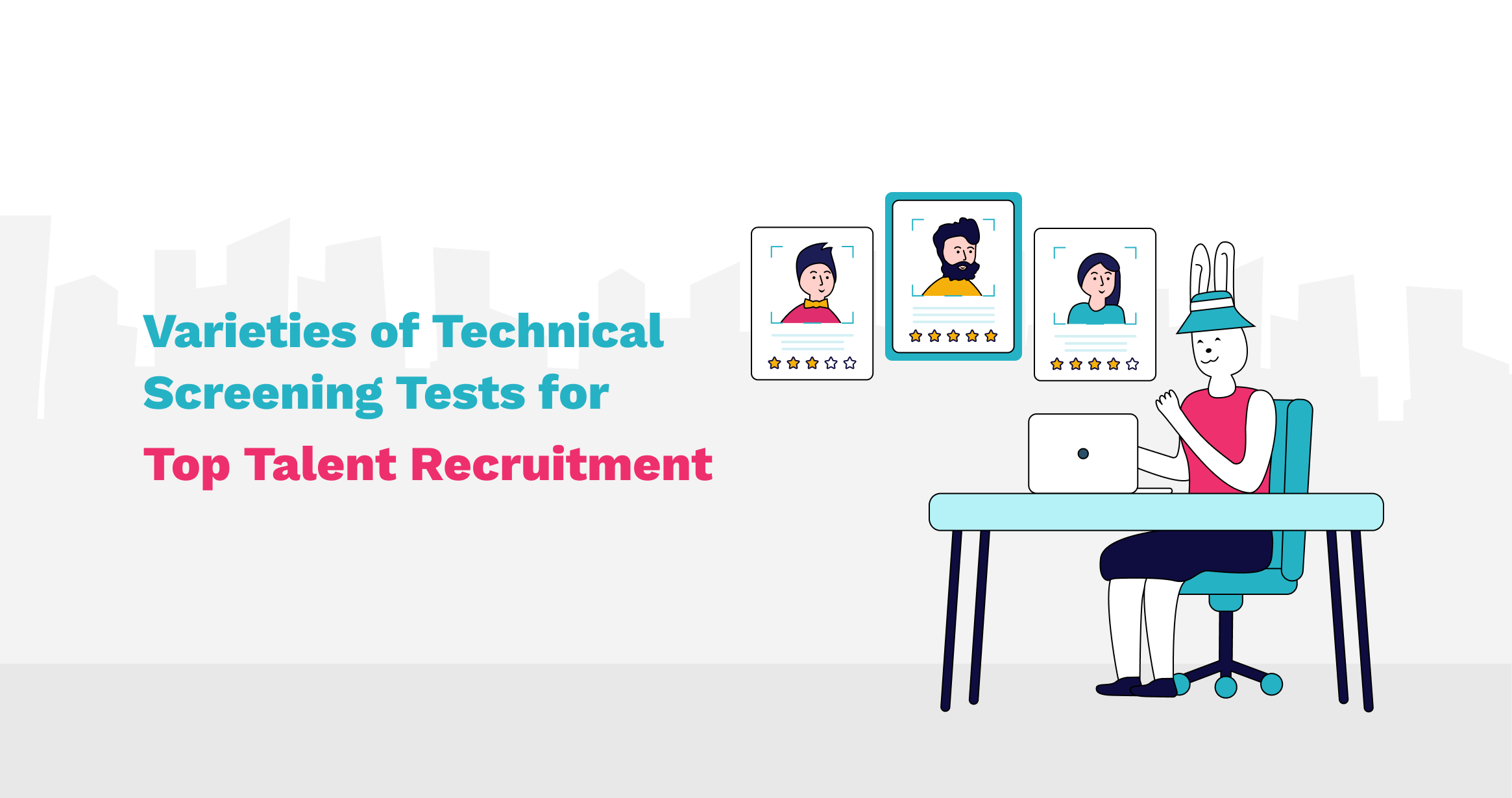Varieties of Technical Screening Tests for Top Talent Recruitment
In the dynamic landscape of IT talent acquisition in 2023, marked by economic uncertainty, diversity and inclusion priorities, and the constant need for upskilling and reskilling, optimizing the hiring process has become paramount. Employers are now steering towards more efficient and data-driven methods to navigate these challenging times and ensure that they make well-informed decisions.
One of the most effective strategies in this evolving hiring environment is the implementation of technical screening tests. These tests serve as a vital component in enhancing the efficiency of the hiring process. An optimal approach involves incorporating the testing phase following the initial contact or a brief introductory call with the candidate.
This approach not only enables organizations to forge a deeper connection with prospective hires but also piques the candidate's interest in both the company and the job prospect. This is especially vital when engaging with senior or high-level candidates who exercise considerable discretion when choosing new career avenues. Moreover, it serves as a valuable means of assessing the candidate's technical knowledge and expertise.
What Is Technical Screening Interview?
Technical screening is the initial phase of the tech recruitment process. Its primary goal is to assess the technical prowess of candidates applying for technical roles within an organization. The process involves evaluating a candidate's proficiency in essential tech areas, troubleshooting abilities, and alignment with the company's culture and values.
Technical Screening Assessments
Technical screening assessments are the cornerstone of the technical recruitment process. These assessments come in various formats, such as programming tasks, multiple-choice tests, or practical assignments, depending on the specific job role and requirements. The primary purpose of these assessments is to evaluate a candidate's competence in relevant programming languages, algorithms, data structures, and analytical thinking skills.
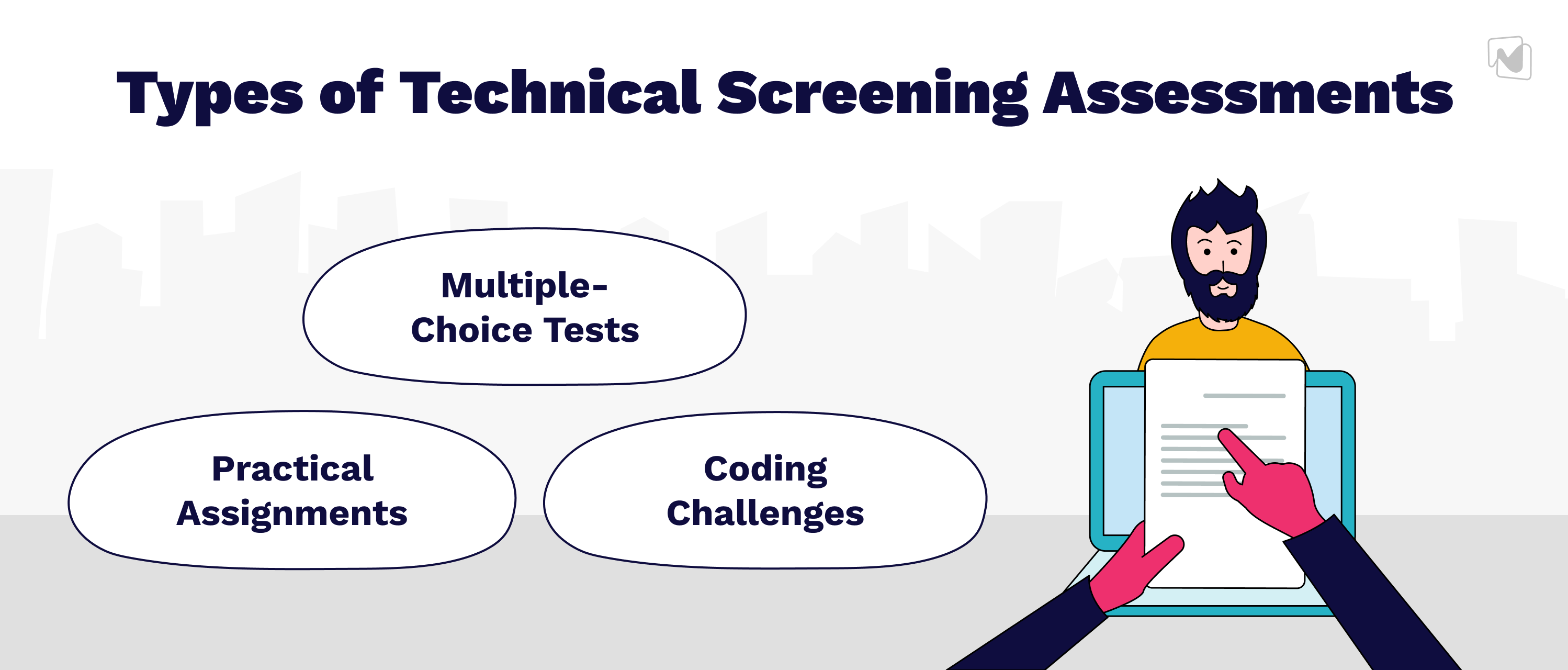
1. Coding Challenges: Candidates are presented with real-world programming problems and are required to provide solutions within a designated time frame. Challenges assess a candidate's programming proficiency, attention to detail, and ability to perform under pressure.
2. Multiple-Choice Tests: Multiple-choice tests typically focus on theoretical knowledge and conceptual understanding. They are used to gauge a candidate's grasp of fundamental concepts in areas like computer science, software engineering, or system architecture
3. Practical Assignments: For senior-level positions, practical assignments may be assigned, where applicants are tasked with solving complex, real-world problems that mimic the challenges they would encounter in the actual job role. This assesses their ability to apply skills in practical scenarios.
Testing Platforms: Companies use various testing platforms that offer a range of assessment types, including programming tests, quizzes, and simulations, to evaluate candidates across different technical domains.
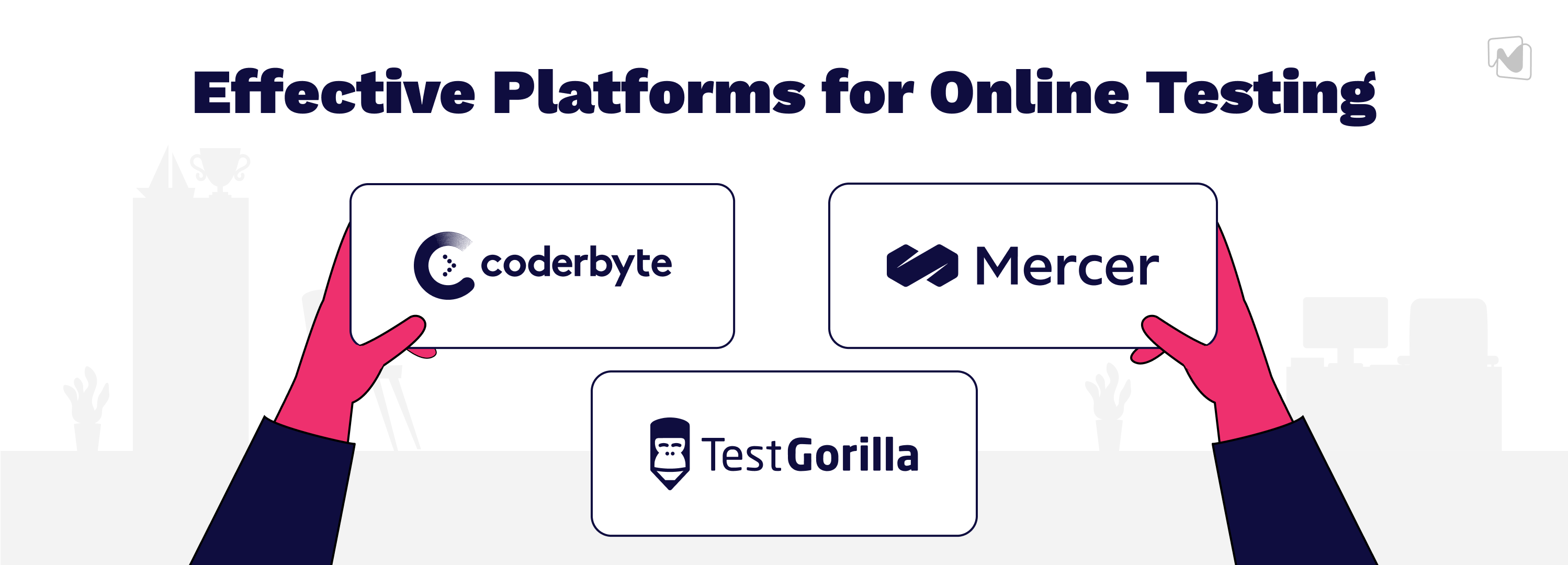
Based on MagicHire experience we have a chance to use such platforms for online testing which we can recommend:
1. TestGorilla: TestGorilla offers a wide range of pre-built tests and assessments to evaluate candidates across various skillsets and roles. It provides an intuitive interface and customizable assessments, making it user-friendly for both employers and applicants.
2. Coderbyte: Coderbyte specializes in coding assessments and challenges. It offers a library of exercises to evaluate programming skills across different languages and domains. It's particularly well-suited for technical roles in IT.
3. Mercer (Mettl): Mercer is known for its comprehensive talent assessment platform, offering various assessments, including technical tests, psychometric tests, and domain-specific assessments. It provides a holistic approach to candidate evaluation.
Related: Top 10 Recruitment Trends to Follow in 2023
Technical Interviews
Tech interviews serve as another pivotal component of the technical screening process. These interviews are typically conducted by technical recruiter or experienced engineers who assess a candidate's problem-solving abilities, hard skills, and overall technical competence. IT interviews can assume various formats:
1. Behavioral Interviews: Behavioral interviews evaluate a candidate's soft skills, work ethic, and general fit within the organization. These interviews may delve into a candidate's past experiences, teamwork, and adaptability in different work environments.
2. Live-Coding session: In coding interviews, applicants are presented with code challenges to solve on a whiteboard, paper, or through online platforms. Interviewers assess not only the correctness of the solution but also the candidate's approach to solution finding and code optimization.
3. System Design Interviews: For roles involving system architecture and design, candidates may be asked to design complex systems, databases, or software architectures. These interviews assess a candidate's critical thinking and ability to design scalable, efficient solutions.
Pair Programming
Pair programming is a collaborative approach to technical screening where applicants collaborate with current team members or interviewers to solve coding challenges or real-world problems. This method evaluates a candidate's ability to work effectively in a team, communicate tech ideas, and adapt to the company's standards and practices.
Pair programming interviews often involve real-time coding, allowing both the candidate and the interviewer to write code together. This enables the interviewer to observe the candidate's critical thinking process and coding style, providing valuable insights into how candidates work in a team setting and their capacity to learn from others.
Why Is Technical Screening Crucial?
Before delving into the strategies for effective technical screening, let's understand why it's so critical for your business's success.
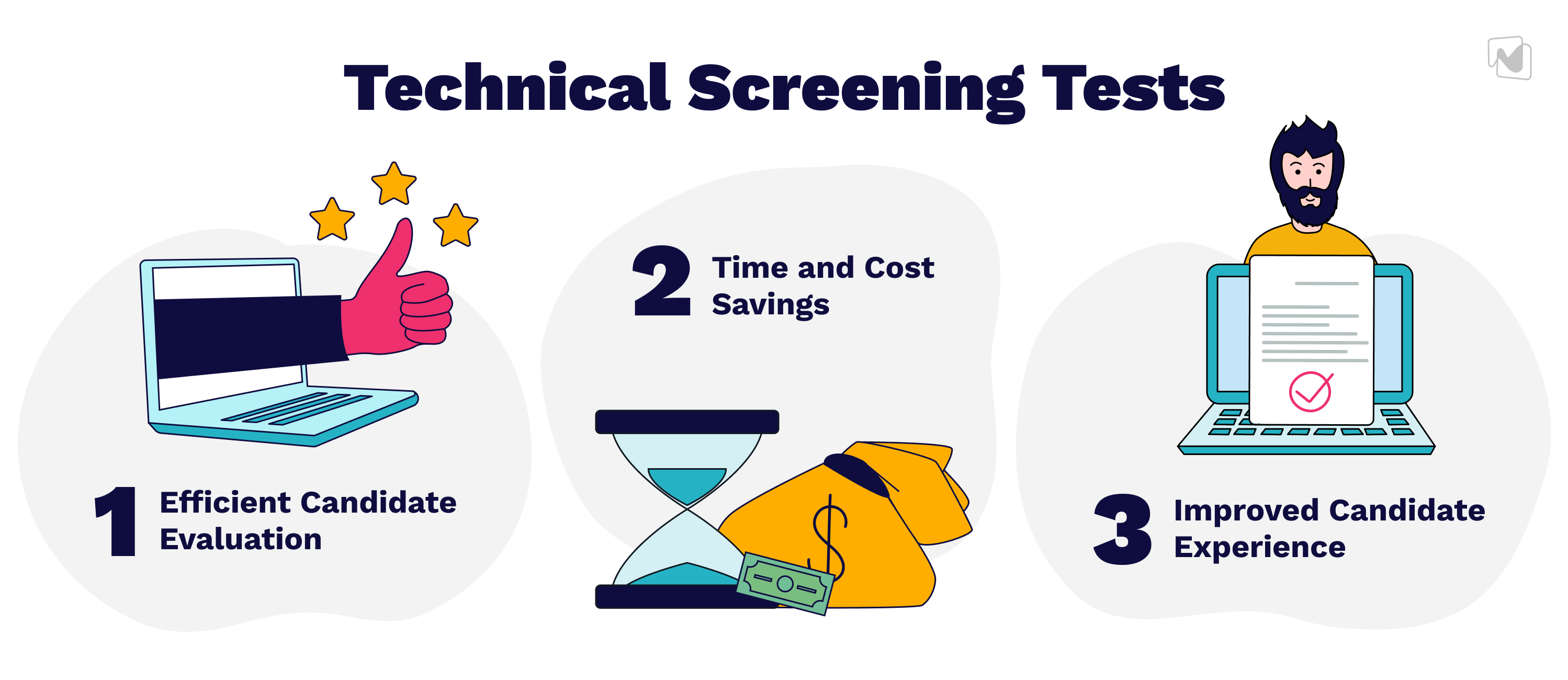
1. Efficient Candidate Evaluation
Technical screening tests allow you to quickly and objectively assess a candidate's tech expertise and knowledge. This efficiency helps you identify qualified candidates early in the interview process. Tests offer an objective gauge of a candidate's capabilities, mitigating the likelihood of bias in the assessment procedure.
2. Time and Cost Savings
Identifying suitable candidates early on reduces the need for extensive interviews (saving the time of all interviewers involved in the interview process always equals money).
3. Improved Candidate Experience
Applicants who are confident in their technical abilities appreciate the opportunity to demonstrate their skills through a technical screening test. It can enhance their overall experience with your company.
Companies employ a variety of tech screening methods to assess candidates' technical aptitude and knowledge for specific roles. These assessments are customized to gauge a candidate's competence in areas pertinent to the job, making them well-prepared for many technical interviews.
7 Effective Steps for Technical Screening to Assess Top Talent
Now that we've emphasized the significance of tech screening in the recruitment process, let's delve into the strategies recommended by MagicHire to proficiently identify the best candidates with top-notch technical skillset.
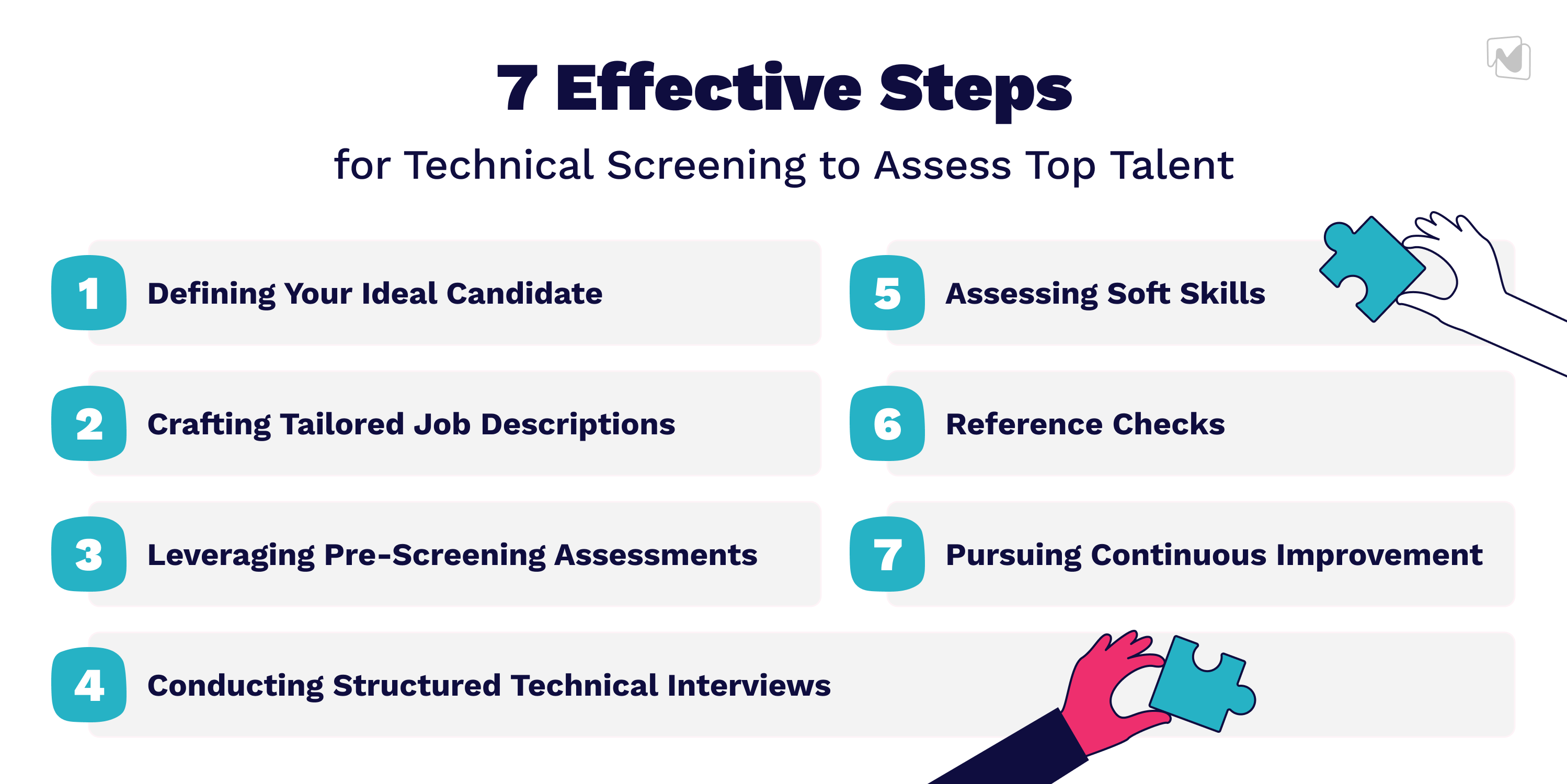
Step 1: Defining Your Ideal Candidate
Before commencing the technical screening assessments, it is paramount to have a well-defined image of the ideal candidate in your mind. This transcends mere tech expertise, encompassing vital aspects such as soft skills, cultural compatibility, and specific experience.
1. Hard Skills: Enumerate the precise proficiency in technology and tools requisite for the role. Whether you're searching for a Python developer, a network administrator, or a data analyst, it is imperative to precisely define the necessary skillset.
2. Experience: Determine the level of experience necessitated. Are you seeking an individual with several years of experience or are you open to considering promising newcomers?
3. Cultural Fit: Identify your company's values and culture. Reflect upon the personality traits that harmonize with your team's dynamics and overall work environment.
Step 2: Crafting Tailored Job Descriptions
Your job postings should be unambiguous, succinct, and captivating. A meticulously crafted job description not only entices the right candidates but also establishes lucid expectations.
1. Detailed Responsibilities: Elucidate the candidate's day-to-day responsibilities and the projects they will be involved in.
2. Required Qualifications: Explicitly stipulate the technical expertise, certifications, and educational background requisite for the role.
3. Company Culture: Accentuate your company's culture, values, and work environment to entice candidates who resonate with your organizational ethos.
Step 3: Leveraging Pre-Screening Assessments
To efficiently sift through a vast pool of applicants, contemplate the use of pre-screening assessments, including coding challenges, technical quizzes, or scenario-based questions.
1. Coding Challenges: For prospective developers, present code assessments that evaluate their puzzle solving acumen and coding prowess.
2. Technical Quizzes: Formulate quizzes to gauge candidates' knowledge of specific technologies or tools pertinent to the role.
3. Scenario-Based Questions: Pose real-world scenarios that candidates may encounter in their role and assess their ability to respond effectively.
Step 4: Conducting Structured Technical Interviews
Structured technical interviews constitute a pivotal element of the entire recruitment process. These interviews adhere to a standardized format and assess candidates based on consistent criteria.
1. Behavioral Questions: Probe candidates about their previous experiences and their approach to handling challenges, teamwork, and conflict resolution.
2. Technical Questions: Present technical screening questions pertinent to the skills required for the role to ascertain their practical expertise.
3. Problem-Solving Challenges: Challenge candidates with real or hypothetical problems to evaluate their troubleshooting aptitude.
Read more: 7 Tips on Developing a Talent Sourcing Strategy And Why You Need One
Step 5: Assessing Soft Skills
While technical skills are imperative, it is vital not to overlook the significance of personal skills. Proficiency in effective communication, teamwork, adaptability, and puzzle solving is crucial in the IT sector.
1. Communication Skills: Evaluate candidates' capacity to elucidate intricate technical concepts to non-technical team members.
2. Teamwork: Inquire about their prior experiences in collaborative settings and their contributions to team projects.
3. Adaptability: Assess their capacity to acquire and adapt to novel technologies and methodologies.
Step 6: Reference Checks
Before arriving at a final decision, conduct comprehensive reference checks. Reach out to their former employers or colleagues to gather insights into their work ethics and performance.
Step 7: Pursuing Continuous Improvement
The recruitment process is an ever-evolving journey. Continuously solicit feedback from your team, candidates, and hiring manager to refine your technical screening strategies. This iterative approach ensures ongoing enhancements and effectiveness in identifying top IT talent.
By integrating these skills and technical interview strategies into your recruitment process, you will be well-prepared to pinpoint and hire outstanding IT professionals, thereby catalyzing your company's growth and success.
Maximizing the Value of Technical Interview: Key Considerations
When integrating technical interview into your recruitment process, there are critical factors to keep in mind to ensure an effective and efficient evaluation of candidates.
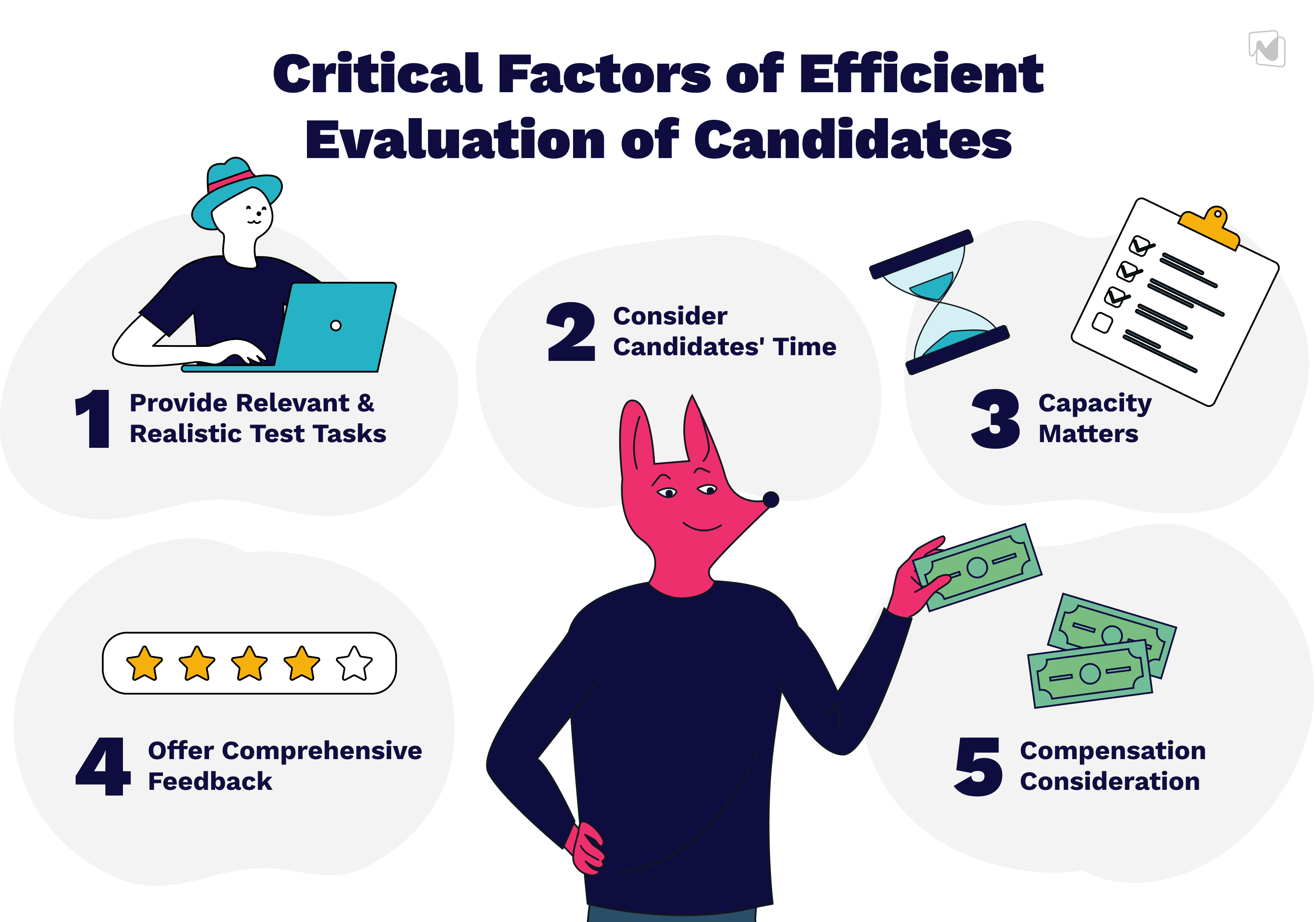
- Provide Relevant and Realistic Test Tasks
It's essential to design test tasks that align directly with the responsibilities of the position. These tasks should be representative of actual job duties and should avoid unnecessary complexity. This common pitfall, often seen in hiring processes, can lead to extended job vacancies and the loss of qualified candidates. - Consider Candidates' Time
Respecting candidates' time is crucial. Avoid overly complex or lengthy assessments that may deter top talent. Strive for a balance between evaluation needs and candidates' schedules. Ideally, test tasks should be accomplishable within a few hours within a single day. To accommodate candidates, consider offering a flexible deadline, granting them a few days to complete the task without imposing a strict timeframe. - Capacity Matters
Managing the end-to-end process of candidate assessment, including creating test tasks and providing feedback, requires an investment in both time and resources. Ensure you allocate the necessary expertise and budget to ensure an effective recruitment process. - Offer Comprehensive Feedback
Candidates invest their time and effort in completing tests. In return, be prepared to deliver detailed and constructive feedback. This feedback not only acknowledges their commitment but also helps candidates understand their performance and areas where they can improve. - Compensation Consideration
For middle to senior-level specialists, acknowledge that the completion of test tasks may warrant compensation for their time and effort. Assess the appropriateness of offering compensation or incentives to attract and retain top talent.
By carefully addressing these factors, employers can establish a well-balanced and efficient technical interview process. This approach optimizes the hiring process, saving both time and money for your business while ensuring the acquisition of top-notch talent.
Conclusion
In the ever-evolving landscape of IT talent acquisition in 2023, characterized by uncertainty, diversity demands, and the continuous need for upskilling, we recognize the challenges you encounter. Employers are increasingly embracing data-driven approaches to navigate the uncertainties, emphasize diversity and inclusion, and meet the ever-present demands for upskilling. That's precisely why collaborating with MagicHire becomes your key to success, especially when it comes to conquering the intricacies of technical screening interviews.
With us, you'll receive a streamlined hiring process that saves you time and resources. Say goodbye to prolonged vacancies and the frustration of losing top candidates. Our technical screening tests, strategically implemented after initial contact, not only build a strong candidate connection but also assess their genuine interest in your role and company.
MagicHire's IT recruitment services are your ticket to a top-tier IT team that drives your business forward. Say goodbye to talent acquisition worries and hello to a seamless recruitment journey. Contact us today to unlock your IT talent potential. Your top IT talent is just a click away!

FAQ
How do you conduct a technical screening?
Conducting a technical screening involves evaluating a candidate's technical expertise and knowledge for a specific role. It typically includes assessments, virtual interviews, and evaluations that assess the candidate's proficiency in relevant areas, such as programming languages, and algorithms.
Why are technical skills important in the hiring process?
They are vital as they ensure that candidates have the expertise needed to excel in their roles, reducing training costs and improving efficiency.
What are some common types of technical interviews used to assess IT candidates?
Common types of technical interviews used to assess IT candidates include coding interviews, behavioral interviews, system design interviews, and pair programming interviews. These interviews evaluate candidates' technical skills, troubleshooting abilities, soft skills, and ability to work effectively in a team.


